Diplomatic Bluebook 2019
Chapter 4
Japan's Diplomacy Open to the Public
2 Consular Service and Assistance for Japanese Living Overseas
(1) Improving Consular Service
With the aim of providing high quality consular services to Japanese nationals overseas, MOFA conducts a questionnaire survey every year on services such as consular staffs' attitudes in over-the-counter consular services, telephone responses at diplomatic missions overseas, and information provision. In 2018, the surveys were conducted by 148 diplomatic missions overseas and received 28,874 responses. The results showed a general level of satisfaction with regard to the overall consular services provided by the diplomatic missions overseas, including over-the-counter services and telephone responses. At the same time, there were harsh evaluations about the attitude of consular staffs and opinions calling for improvement. As such, MOFA will continue its efforts for improvements, reflecting user feedback in enhancements and improvements of consular services, so as to provide consular services at the diplomatic missions overseas in line with users' perspective.
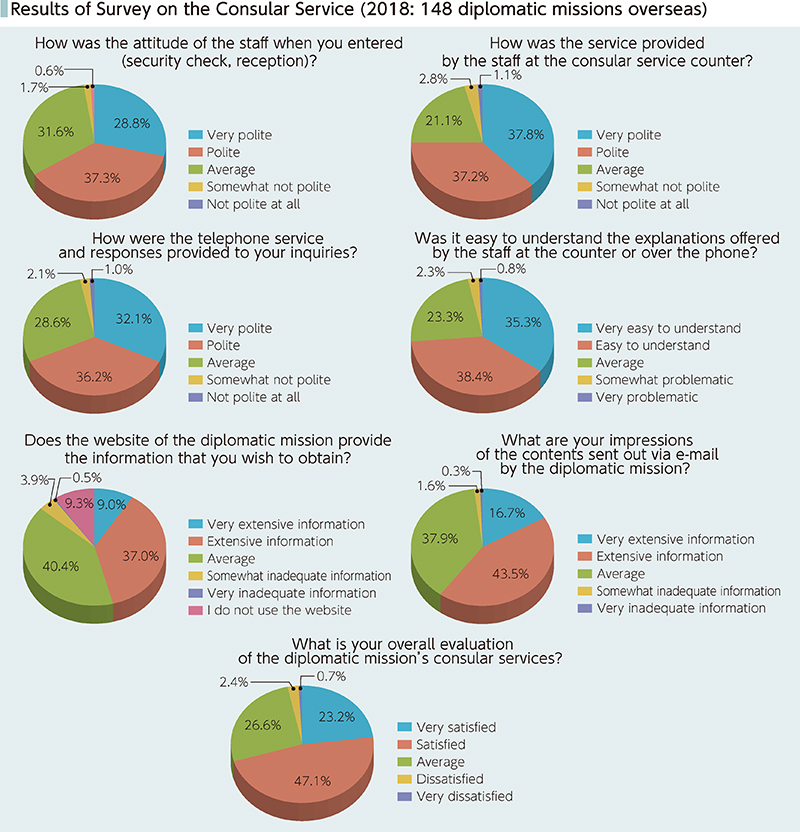
(2) Issuance of Passports and Prevention of Illicit Acquisition of Passports
Approximately 4.31 million passports were issued in 2018. As of the end of December 2018, approximately 29.98 million ordinary passports are valid, and all of them are ePassports3.
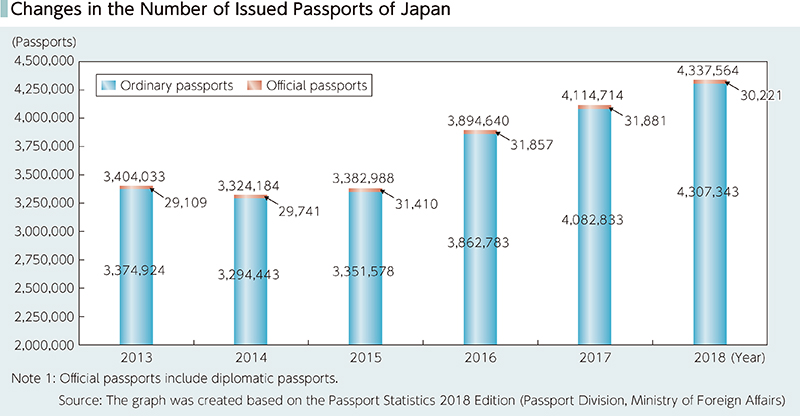
The issuance of ePassports is effective for deterring illicit use of passports such as forged or altered passports. However, there continue to be cases of illicit acquisition of passports by means of impersonation4. There were cases where Japanese nationals or illegal foreign residents left and entered Japan using passports acquired illegally under the name of another person. Also, passports with false identities were used for borrowing money from financial institutions, opening bank accounts for the purpose of selling them to those who plot to commit other crimes, and subscribing to mobile phone services without the real passport holders knowing it. In order to prevent illicit acquisition of passports that may nurture these secondary or tertiary crimes, MOFA has been making further effort to enhance strict identity examination in issuing a passport, for example, by such means as designating a tighten inspection period against illicit acquisition of passports through identity theft at passport offices located in each prefecture. Furthermore, restrictions are placed on the issuance of passports to persons who are undergoing criminal prosecution, persons who have a suspended sentence, persons who violated the Passport Act, etc. Upon a report from relevant institutions, the Minister for Foreign Affairs orders the surrender of passports to persons against whom an arrest warrant has been issued.
While the integrated circuit (IC) chips in Japanese passports record facial images and other information identifying the passport holders, ePassports with improved security against counterfeiting using biometric information such as fingerprints have become widespread in other countries, and possibilities for more effective use of IC chips are under consideration at the International Civil Aviation Organization (ICAO) and the International Organization for Standardization (ISO). In addition, starting October 1, 2018, ‘downloadable applications' launched on January 4, 2016 at diplomatic missions overseas are now adopted in Japan as well, improving convenience for applicants.
Consignment of passport-related work such as application and delivery, from the prefectural governments to city/town offices has been permitted since 2006. 837 cities/towns had started passport service by the end of 2018, which make up almost 50% of all the cities/towns in Japan.
- 3 An ePassport is a passport embedded with an integrated circuit (IC) chip which contains a digitized facial image (biometric information) and other information of the passport holder to prevent passport forgery and its illicit use by a third party. It was first issued in 2006.
- 4 The number of illegal acquisitions of passports through identity theft discovered: 41 in 2014, 31 in 2015, 22 in 2016, 21 in 2017, and 35 in 2018.
Consular Office of the Embassy of Japan in China
The number of foreign visitors to Japan reached the highest on record at 31.19 million in 2018. With the further increase of tourists and other visitors from foreign countries, the number of visa issuances is approximately 6.95 million in 2018, and 78% of them were issued to Chinese citizens. The Government of Japan is pursuing initiatives to make Japan a tourism oriented country and the relaxation of visa requirements also boosts the increase of foreign visitors. On the other hand, it is also important to conduct a strict visa examination to prevent the entry of foreigners who might harm Japan's interests. Visa officers in charge of issuing visas at the Embassies and Consulates-General of Japan around the world are struggling daily with many application documents.
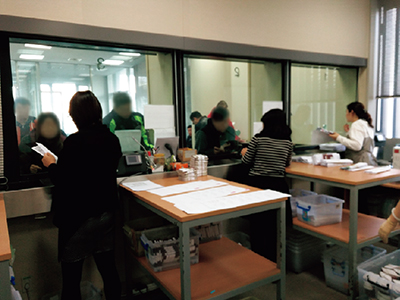 Visa reception counter
Visa reception counterIn recent years, the number of Chinese people visiting Japan, mainly tourists and business people, has been steadily increasing. The number of visa issuances at the Embassy and Consulates-General of Japan in China is remarkably high, and visa officers are extremely busy every day. For example, the Embassy of Japan in China issues approximately 1.2 million visas a year. This means receiving approximately 5,000 visa applications per day and over 10,000 visas at peak times. The number of visa issuances climbed from 0.51 to 1.35 million in the five years from 2014 to 2018. However, the number of visa officers is not keeping the same pace with the increase in issuance volume. The staff of designated travel companies (proxy application company) come to the visa counter of the Embassy in the morning every day to submit applications and pick up approved visas. Visa officers must carefully examine related documents in a matter of minutes each day in order to correctly and quickly process a high volume of applications within a fixed amount of time with a limited number of people.
Given this situation, the Ministry of Foreign Affairs (MOFA) and the Embassy and Consulates-General of Japan in China are constantly seeking to enhance efficiency and streamline the visa examination process. For example, as an initial streamlining attempt, since fall 2018, Japan has been promoting a change in the payment method for visa application fees from cash to bank transfer to the account of the Embassy of Japan in China, which has been applied to all designated travel agencies. This was the first time such a measure had been implemented by a Japanese Embassy, Consulate-General or permanent mission of Japan. Visa officers prepared extensively for this unprecedented change by holding briefings for designated travel agencies, reviewing work procedures, and assigning roles within the Embassy and Consulates-General to ensure that everything would go smoothly. As a result, the change improved work efficiency, especially by removing the tasks of checking whether any counterfeit notes are mixed in with the massive amounts of cash and calculating cash amounts.
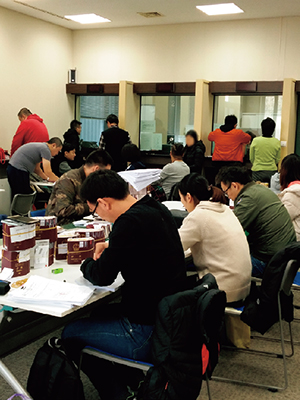 Visa waiting area full of designated travel agencies
Visa waiting area full of designated travel agenciesAs the second streamlining attempt, MOFA is actively promoting a paperless format with electronic applications that replaces the previous method of conducting examinations of visa application documents only after receiving hard copies of them. This will streamline data input work at the Embassy of Japan in China. While Japan plans to launch electronic visas using an electronic procedure for the Embassy and Consulates-General of Japan in China from April 2020, the Embassy of Japan is implementing this format as a pilot site.
Nevertheless, the benefits from enhancing work efficiency and streamlining are limited to data input and visa seal printing and other things handled by local staff. The extremely important examination task, which must be handled by visa officers themselves, continues to require rigorous checks, including from the standpoint of border control.
Visa officers not only at the Embassy of Japan in China, but also around the world carry out their examination tasks in a matter of minutes day and night to promote people-to-people exchanges between respective countries and Japan and facilitate the appropriate flow of people into Japan.
(3) Overseas Voting
The overseas voting system allows Japanese voters living overseas to vote in national elections. In the elections after June 2007, it was made possible to vote from overseas for the small electoral district election of the House of Representatives and the electoral district election of the House of Councillors (including by-election and recall election), in addition to voting for the proportional representation segment of elections of the both Houses. In order to vote from overseas, it is necessary to be registered in advance on the overseas voter directory managed by the election board of the city/town government and to obtain overseas voter identification. Starting in June 2018, in addition to the conventional method of applying through a diplomatic mission overseas after moving overseas, Japanese nationals can now apply at their municipality service counter at the same time as filing their notice of moving overseas. As a result, there is no longer a need to appear in person at a diplomatic mission overseas after moving outside Japan, which simplifies procedures and is expected to lead to an increase in registered voters. Voters with valid overseas voter identification can vote by choosing one of the three methods of voting, a) voting at diplomatic missions overseas, b) voting by mail, or c) voting in Japan.
The diplomatic missions overseas have been making efforts to disseminate the system and to increase the number of registered voters by publicizing this system and carrying out a visiting service for the registration of Japanese nationals living in remote areas. Also, whenever an election is held, diplomatic missions overseas are responsible for voting administration, including PR prior to elections.
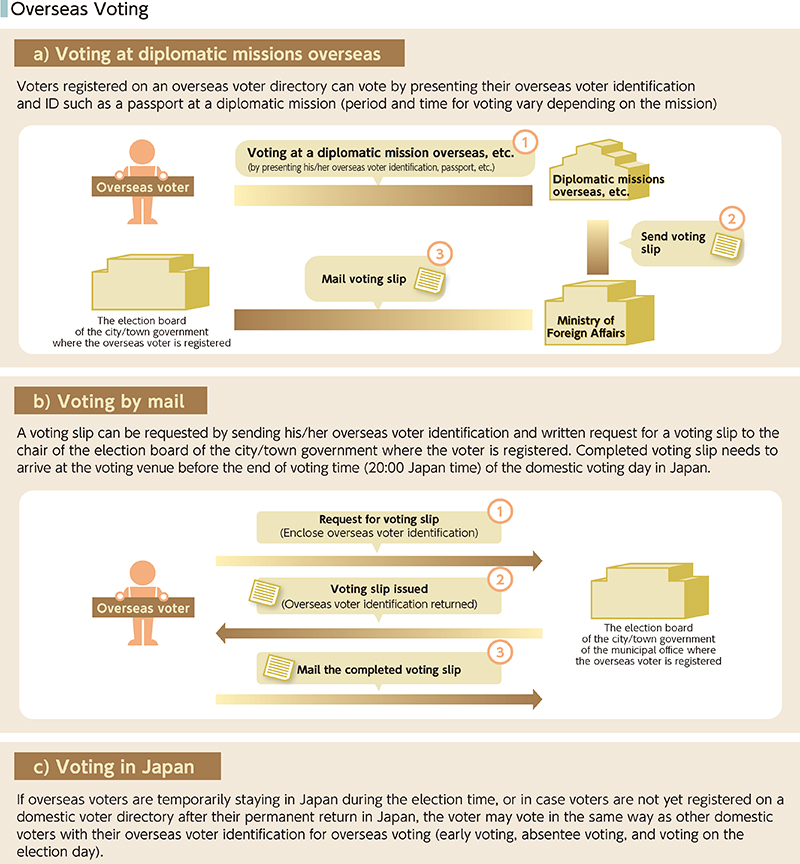
(4) Assistance for Japanese Nationals Living and Engaging in Activities Overseas
A Japanese Schools and Supplementary Education Schools
Education for children is one of the major concerns for Japanese nationals living abroad. In cooperation with the Ministry of Education, Culture, Sports, Science and Technology, MOFA carries out assistance for the Japanese Schools (partial assistance for school building rental fees, rewards for locally hired teachers and safety measures expenses) so that the overseas school children at the age of domestic compulsory education can receive education equivalent to that of Japan. MOFA also provides the same assistance as that for the Japanese Schools to the Supplementary Education Schools (educational institutions established to maintain children's ability, such as Japanese language ability) mainly in areas where the Japanese Schools are not located. In addition, MOFA is further strengthening and expanding assistance related to safety measures in light of the recent changes in the international terrorism situation. MOFA will continue providing these forms of support in the future.
B Medical/Health Measures
MOFA gathers information on infectious diseases being spread overseas and provides this information to a broad audience through the overseas safety website, websites of diplomatic missions overseas, email, etc. Furthermore, in order to provide health advice through consultations to Japanese nationals residing in countries where the medical situation is poor, MOFA dispatches medical teams with the support of domestic medical institutions (to one country, seven cities in FY2018). MOFA also dispatches medical specialists to regions where infectious diseases or air pollution has become serious, and organizes health and safety lectures (12 countries, 13 cities in FY2018).
C Responses to Other Needs
In order to eliminate the complexity of various procedures for Japanese nationals living overseas (such as converting Japanese driving licenses to the country of residence, obtaining stay/work permits) and to make living abroad more comfortable, MOFA continues talks with foreign governments.
For example, when converting driving licenses issued in foreign countries to Japanese driving licenses, all persons with driving licenses issued in a foreign country are exempted from taking certain examinations, when it is confirmed that they have no problems with operating vehicles. On the other hand, it is mandatory to take driving tests when converting Japanese licenses to local licenses in some countries and states, such as North and South America. MOFA is calling for those countries to simplify the procedures for license conversion as in Japan.
MOFA also supports victims of atomic bomb attacks living overseas in applying for the authorization of Atomic Bomb Diseases and for the issuance of Health Check Certificates, via diplomatic and consular missions.

